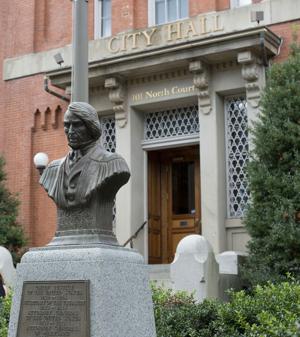 |
The bust of Chief Justice Roger Brooke Taney, author
of the proslavery Dred Scott decision in 1857, stands
outside Frederick, Md., City Hall.
Photo: Jess Bravin/WSJ
|
Officials in Frederick, Md., favor removing a bust of Roger Brooke Taney, author of the 1857 Dred Scott decision
Chief Justice Roger Brooke Taney, author of the 1857 Dred Scott decision that enshrined slavery and paved the way to the Civil War, is honored across his hometown, which boasts a Taney Avenue, Taney museum and Taney’s tomb, where a plaque declares him “an upright and fearless judge.”
That may be changing as Frederick, along with much of the nation, reassesses pro-Confederate iconography following the June Charleston, S.C., church shooting, where the suspected killer posed with Confederate symbols. At an August meeting, a majority of the all-white Board of Aldermen indicated they are ready to remove a bust of Taney that sits at City Hall’s entrance, after beating back similar proposals in previous decades.
“I think the location of the statue is inappropriate,” said Alderwoman Donna Kuzemchak, who has been trying to remove the Taney memorial since 1997. She said the Charleston shooting focused attention on the message the bronze sends. “Maybe this is a time we can actually do something about this,” she said.
 |
Dedication of the Taney statue took place in 1931. Chief
Justice Charles Evans Hughes, left, and Maryland Gov.
Albert Ritchie flank the bust.
Photo: Historical Society of Frederick County
|
Taney long has been controversial in this history-steeped town 50 miles north of Washington, D.C. In February 1965, the local paper reported that someone placed a noose around the statue’s neck. No one last month proposed hanging Taney in effigy, but feelings still ran deep.
Statue opponent Hayden Duke, who spoke in opposition to the statue, cited an 1865 U.S. Senate debate that ended with lawmakers killing plans to spend $1,000 to put a Taney bust in the U.S. Capitol. “Sen. Charles Sumner [R., Mass.] said the following: ‘If a man has done evil during his life he must not be complimented in marble,’” Mr. Duke told the aldermen. “I would say, very passionately, very strongly, that I agree with Charles Sumner.”
Michael Powell, a history professor at Frederick Community College, countered that “Taney is a seminal figure” whose decisions were “instrumental in transitioning this country into a market economy.” He said it was unfair to stigmatize Taney simply because of Dred Scott. “The last person I know who walked on water was 2,000 years ago,” he said.Read the rest of the story HERE.
If you like what you see, please "Like" us on Facebook either here or here. Please follow us on Twitter here.



No comments:
Post a Comment